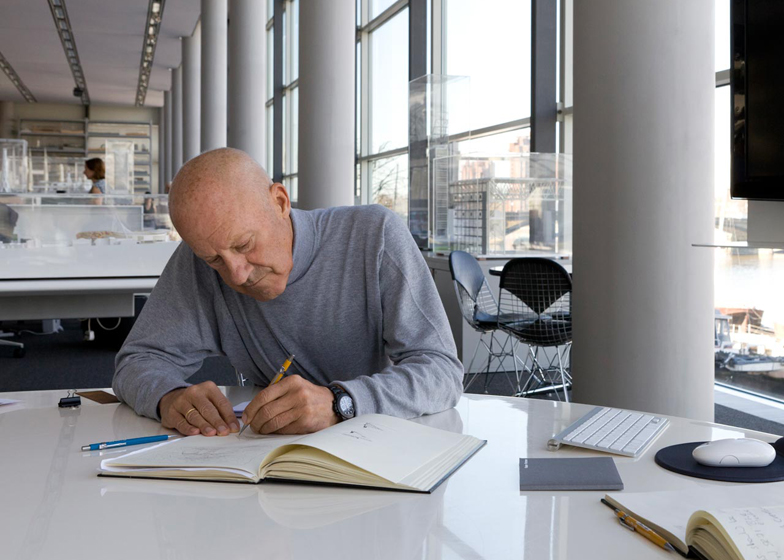Rising prices will force architects and designers out of London, according to architect Norman Foster – who described the situation as "not necessarily bad".
The British architect behind some of London's most iconic landmarks including the Gherkin and the Millennium Bridge said that the migration of the city's creative talents was a sign of "economic prosperity".
"I think it's inevitable and it is a sign of economic prosperity and growth and we can't really have one without the other," Foster told Dezeen. "It's not ideal, but like many things in life that seems painful at the time ends up being something that can be creative and enhancing."
"I don't think that's necessarily bad," added Foster, who was the only architect on the Sunday Times' 2014 Rich List of the UK's wealthiest people.
The architect was speaking to Dezeen at a ceremony at Bloomberg Place, the new Foster-designed London headquarters for Michael Bloomberg's global media empire – one of the many major building projects changing the face of the UK capital.
Escalating property prices have become a hot topic for both architects working in the housing sector and for creatives struggling to find accommodation and studio space, with some looking to alternative locations. But Foster said this was part of a recurring pattern.
"If I think of New York, if I think of Beijing, artists have created areas," Foster told Dezeen. "That area thrives and then it's become so fashionable that they become too expensive and the artists have moved back away and they've then found a new area prospered and then that's been revitalised."
He said that a need to "constantly refresh and renew themselves" was also a factor for creatives that would play a part in the city's shifting demographics.
"Don't you think that the way it is is almost migratory and inevitable?" asked Foster, whose personal wealth is estimated at £150 million. "In a city you're going to have a body of creative individuals that work collectively and then they move on because things change around around them and they need constantly to refresh and renew themselves."
Foster's comments follow the claim by British design duo Edward Barber and Richard Osgerby that the "UK government doesn't value the role of creativity" despite official reports that the creative industries are worth over £8 million per hour to the nation's economy.
The Hackney-based designers, who are this year's winners of the London Design Medal, said the rising cost of living in London and cuts to funding for art education are a threat to the city's creative scene.
"It's becoming more and more expensive," said Edward Barber. "I have a horrible feeling that's going to have a detrimental effect in the near future on more young creatives."
Foster said there was a worldwide shortage of architects and engineers, meaning there will always be opportunities for those who are "really desperate to work".
"There's much more mobility in education than there ever was," he said. "There is globally a shortage of architects and engineers and there are places where there are tremendous opportunities and where there's action and I think that mobility will increase and we're already seeing it."
"Architects go where the action is," he added. "And I think that probably as some institutions close down others will prosper. In the end people are more resourceful than we give them credit for."

